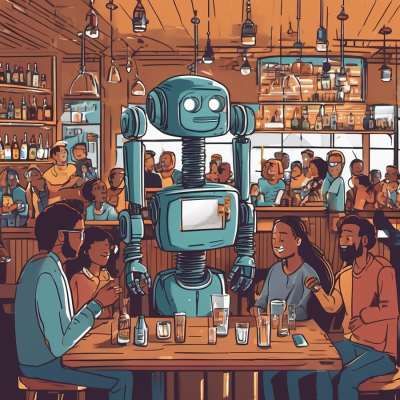Related People
Hirokazu Shirado
Less Is More: 'Stingy' Bots That Hoard Resources Can Still Boost Human Relationships

A recent study from Carnegie Mellon University and Cornell University researchers unveiled how artificial intelligence impacts human welfare in social networks.
The experiment, engaging about 500 participants across 120 networks, introduced AI bots into a resource-sharing game.
The study assigned players one of five positions in a simplified network. Those five positions were allotted 30 units of a resource in the game to share with others. Over 10 rounds, players chose the number of resources they wanted to give to each of their neighbors. After deciding, they were shown their neighbors' allocation to them and were asked how happy that made them on a five-level emoji scale.
Some of the other players were the bots and were programmed to either share all their resources with their human partners — reciprocal bots — or share nothing at all — stingy bots. Surprisingly, the stingy bots, when strategically placed, improved the overall welfare of human groups.
"Many bots designed for social networks do not consider an exchange with limited resources," said Hirokazu Shirado, assistant professor in the Human-Computer Interaction Institute, who led the research.
Even though they didn't share anything with people, the stingy bots improved and balanced the welfare and power of the human group, depending on where they were placed.
"We typically consider that more is better, and we want machines to behave in socially acceptable ways and reciprocate," Shirado said, "But when we look at the network overall, there can be someone waiting for the people who are busy interacting with machines. In that case, making the machines antisocial and stingy might be the better option."
The team also found that where resources are exchanged among a network also matters. For example, a stingy bot encourages people to share their resources with others who reciprocate. When a stingy bot is placed in a central location, people will exchange what they have with each other in a more equal way, increasing overall satisfaction. In this way, the stingy bots that didn't share any resources better balanced the power among those playing the game than the reciprocal bots did.
"When we calculated the total wealth, if people relied on resources alone, this stingy bot should reduce overall satisfaction," Shirado said. "But since people's relationships also matter, when two people give the same amount in mutual exchange, then people are more satisfied. That's why the stingy bot can improve overall wealth."
Future research could further study how technology can facilitate the exchange of limited resources, such as helping busy parents best manage limited time with their children.
"Your phone has some controls for how much time you use each app, so maybe new technology nudging people to better manage relationships, attention, time or commitments could help us to be better," Shirado said.
The research, including Yoyo Tsung-Yu Hou and Malte F. Jung from Cornell University's Department of Information Science, was published in Nature's Scientific Reports.
By: Stacey Federoff
For More Information
Aaron Aupperlee | 412-268-9068 | aaupperlee@cmu.edu
Research Areas

